Joint Base Charleston
About Joint Base Charleston
Joint Base Charleston (JB Charleston) is home to the Air Mobility Command’s (AMC) 628th Air Base Wing. In addition, the 437th Air Wing and the 315th Air Wing, Air Force Reserve Component, operate the C-17 Globemaster III from JB Charleston. Unlike most military airfields, JB Charleston operates a joint civilian-military airport, sharing runways with Charleston International Airport.
JB Charleston began in 1919 when Army Colonel Herbert A. Dargue visited in search of a suitable landing field. Dargue served as chief of air service, the forerunner of the FAA. Thus began a collaboration between the city and the military that continues today. JB Charleston has been home to many of AMC’s most famous aircraft, including the C-119 Flying Boxcar, the C-121C Constellation, the C-124C Globemaster, the C-130 Hercules, and the C-141 Starlifter. It has also seen the F-86D Sabre and F-101 Voodoo fighter planes call Charleston home.
JB Charleston and Joint Base Charleston-Weapons Station (JBWS Charleston) are about a 30-minute drive from one another. In October 2010, Charleston Air Force Base was officially renamed Joint Base Charleston when it combined support functions between the Air Force and Navy, both of which operate in Charleston. The Joint Base, which includes JB Charleston and JBWS Charleston, employs approximately 20,000 active-duty, reserve, and civilian employees. JB Charleston has a diverse mission that somewhat uniquely includes operating and maintaining three locomotives critical to moving ammunition, Mine-Resistant Ambush Protected (MRAP) light tactical vehicles, and tanks.
Nestled on around 24,000 acres, JB Charleston is in the heart of the South Carolina Lowcountry. Just about 30 minutes away is JBWS Charleston. While you can be stationed at either, JB Charleston and JBWS Charleston truly operate as a joint base despite the geographic distance. JB Charleston is located 10 miles from downtown Charleston. Charleston enjoys a moderate cost of living and is home to many military retirees who love the area. With a moderate climate and a city rich in culture and full of things to do, your time at JB Charleston should be delightful. Who knows, you may just decide Charleston will be your forever home someday.
About Charleston
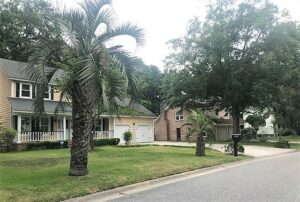 Just the name Charleston evokes images of the antebellum South. Sounds of a southern drawl, endless glasses of sweet tea or mint juleps, and a slower, quieter way of life may also come to mind when you think of this region. Yes, Charleston has a vivid and rich history, but it is so much more than a holdover of days long past.
Just the name Charleston evokes images of the antebellum South. Sounds of a southern drawl, endless glasses of sweet tea or mint juleps, and a slower, quieter way of life may also come to mind when you think of this region. Yes, Charleston has a vivid and rich history, but it is so much more than a holdover of days long past.
Charleston is the third largest city in South Carolina, with a population of around 712,000. Initially established in 1670 at Albemarle Point, just
northwest of the current city center, Charleston’s first name was Charles Town. It was the first comprehensively planned town following the Grand Model plan created by
John Locke. By 1690, it was the fifth-largest town in America. In May of 1718, the city was besieged by the infamous pirate Blackbeard, and by the mid-1800s, boasted the largest population in America south of Philadelphia.
Charleston has a rich military history as well. It was attacked no less than three times during the American Revolution and, in 1780, was the site of the worst defeat American forces suffered in the war. The first battle of the Civil War took place in Charleston Harbor. Its importance as a port city helped to make it one of the premier tourist destinations in the 1920s, an economic boon that continues today.
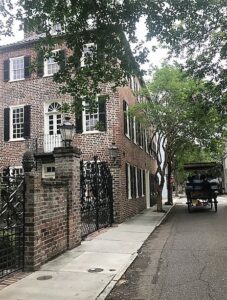 Known as “The Holy City” because of the religious refugees who flocked there, Charleston boasts the oldest black church and congregation in the South. It is also home to the fourth-oldest Jewish congregation in the United States. Interestingly enough, given its history as a place for religious refugees, Roman Catholics were prohibited from settling in Charleston during colonization.
Known as “The Holy City” because of the religious refugees who flocked there, Charleston boasts the oldest black church and congregation in the South. It is also home to the fourth-oldest Jewish congregation in the United States. Interestingly enough, given its history as a place for religious refugees, Roman Catholics were prohibited from settling in Charleston during colonization.
Due to the myriad cultures that flocked to the city, Charleston has grown into a unique culture that blends traditional Southern U.S. charm with English, French, and West African elements. This diversity has created a city rich in arts, music, and culinary wonders. For instance, the city had tremendous influence in the early development of American jazz music and is the birthplace of a bit of dance called, appropriately enough, the Charleston.
Defined by cobblestone streets, antebellum architecture, and horse-drawn carriages, Charleston has something to offer everyone. From historic walking tours to plantation homes; from the Morris Island Lighthouse to the Arthur Ravenel Jr. Bridge; from beautiful beaches to the only place in the U.S. where tea is grown, Charleston is full of things to do. Whether you’re a history buff, an outdoor lover, or a ghost seeker, Charleston can accommodate your interests. Make the most of your time in this prosperous city.
Last piece of advice? Never eat in the same restaurant twice. You are guaranteed to fall in love with Charleston cuisine. The calories you consume can easily be worked off by walking along the Battery or visiting the city's numerous parks.
Looking at relocating?
Enter your information below and we will reach out to help the process.
Nearby Neighborhoods
Neighborhoods
Charleston is a charming, picturesque city settled along the banks of Charleston Harbor. An important port city, Charleston’s economy is rich and storied from its earliest days as South Carolina’s oldest city to the present. There is plenty to do in Charleston, and the base’s location just north of the downtown area makes it ideal. Boasting some of the best schools in the state, which have an excellent record of working with military families, Charleston may be one of the easiest transitions you make. With a low cost of living, many families choose to live off post, but families report satisfaction with both on- and off-post housing options.
JB Charleston/JBWS Charleston
Many families choose to live in the base’s privatized family housing options. Both JB Charleston and JBWS Charleston offer on-base options. If you choose to live on base, you will be sharing your housing areas with active duty, civilian employees, retired military, and some pre-screened civilian-only families.
JB Charleston Housing (JBWS Charleston) was the recipient of the 2018 Resident Satisfaction Award and offers amenities such as a community center, dog park, lawn care services, playgrounds, trails, and resident events. In addition, it has a Residents’ Bill of Rights and takes the needs of its residents seriously.
JBC: A Hunt Military Community (JB Charleston) offers 3- and 4-bedroom houses with free renters insurance and 24-hour maintenance. In addition, you have access to top-rated schools within three school districts. Both JB Charleston and JBWS Charleston offer school liaison officers to help with relocating your school-age children. School choice is important to Charleston, and in 2012 the city passed a resolution holding slots open at all the city’s choice schools for military families PCSing in after lottery or application deadlines.
Big Plus
- Two words: No commute!
- JB Charleston has on-base elementary and middle schools.
- Living on base affords proximity to base amenities.
- Housing is modernized.
Things to Consider
- Housing may be significantly smaller than what you can get on the
economy. - Some housing is newer than others.
- On-base homes may or may not come with a garage.
Indigo Fields
Most military families who live off base choose to live in subdivisions in the North Charleston area, closer to the base. Indigo Fields is one such community and one of the area's more expensive subdivisions. These are newer homes built in the late 1990s and 2000s. Indigo Fields is about a six-minute drive to JB Charleston.
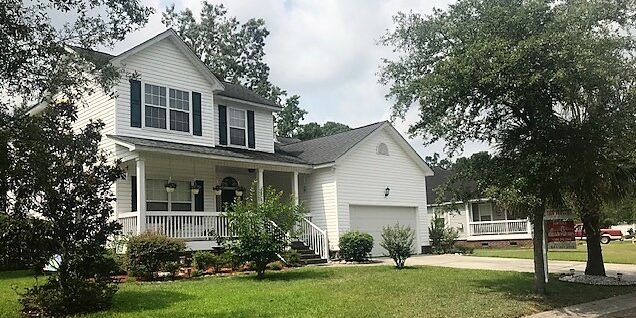
Big Plus
- You’ll only have a short commute to the installation.
- Parks and recreation opportunities are close by.
- Even though it’s off post, this area still provides proximity to base amenities.
- This subdivision feeds to good schools.
Things to Consider
- This neighborhood has no amenities center.
- You’ll have to deal with a bit of a quirky exit (U-turn required if arriving
from the east or trying to go west from the subdivision).
Archdale
Only five minutes from JB Charleston, Archdale is another popular choice for military families. Archdale is a slightly older community than Indigo Fields, with homes built between the mid-1980s and the 1990s. Many call Archdale the closest “nice” neighborhood to base. As with all homes built in this period, floor plans may be outdated, and you’ll need to pay attention to the roof of any house. Many still have what locals call a “Hurricane Hugo” roof, meaning the roof was new or replaced 15-20 years ago.
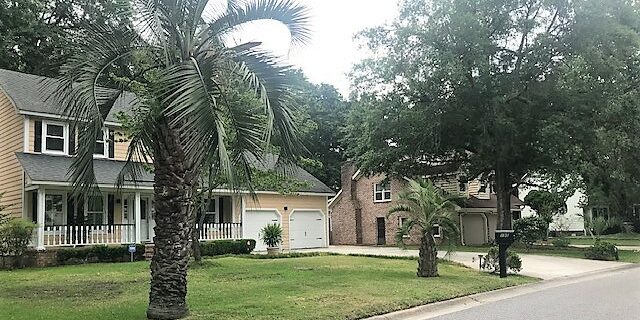
Big Plus
- The installation is only a short commute away from here.
- You’re still close enough to the installation to afford you proximity to base amenities.
- This community also offers proximity to parks and recreation opportunities.
- The area’s exemplary schools are a draw for families with school-age children.
Things to Consider
- Homes tend to be outdated or potential fixer-uppers.
- Look closely for moisture/wood rot.
- Be sure to assess for hidden maintenance costs.
Windsor Hills
Just a scant 10-minute drive from JB Charleston, Windsor Hills offers some of the lowest per-square-foot costs for housing in the area. Homes were primarily built in the 1990s. Windsor Hills is located in the Dorchester School District Two, as with the other neighborhood options. This subdivision is slightly closer to JBWS Charleston than Indigo Fields or Archdale, offering a 20-25 minute commute to that installation.
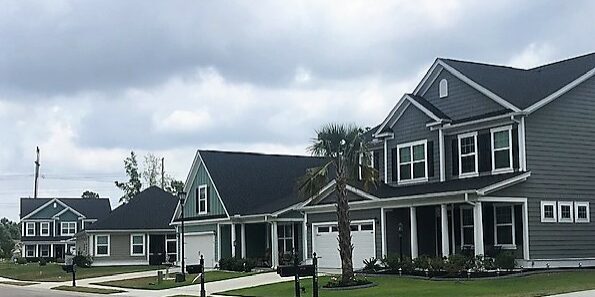
Big Plus
- You can still have a short commute to JB Charleston and a reasonable commute to JBWS Charleston from here.
- This area affords access to good schools as well as proximity to parks and recreational opportunities.
- At only 10 minutes from JB Charleston, this subdivision still gives you proximity to base amenities.
Things to Consider
- It’s a slightly longer commute to JB Charleston from here (if you consider 10 minutes to be long).
- You’ll want to factor in potential maintenance costs for homes in this area, as most are not newer builds.
7 Reasons You Should Consider Buying a Home
1. TAX ADVANTAGES
To encourage homeownership, the IRS has provided many tax breaks for owning a home. Credits may be available for specific home improvements, such as using clean energy or for qualified first-time home buyers. The way most homeowners see those advantages is through income tax itemization and deductions like mortgage interest and real estate taxes.
2. STABALIZE MONTHLY HOME COSTS
Owning your own house is one of the safest bets on stabilizing your monthly home costs. There’s no worry of rent getting increased significantly after each year of living in someone else’s home. Additionally, when you answer to yourself, there is no worry of landlord changes or unexpected lease termination.
3. HOUSE HACKING
Generally speaking, house hacking is a smart strategy that involves renting out a portion of your primary residence as a means of generating income to offset your own living expenses. Think turning your finished basement or mother-in-law quarters into an AirBnB! Or consider purchasing a multi-unit duplex or triplex: live on one side and rent out the other! If your home making money while you’re living in it doesn’t sound like your thing, there’s always renting it out after you PCS as an income generating investment property.
4. Increased Privacy
Generally speaking, house hacking is a smart strategy that involves renting out a portion of your primary residence as a means of generating income to offset your own living expenses. Think turning your finished basement or mother-in-law quarters into an AirBnB! Or consider purchasing a multi-unit duplex or triplex: live on one side and rent out the other! If your home making money while you’re living in it doesn’t sound like your thing, there’s always renting it out after you PCS as an income generating investment property.
5. Pets Are Welcome!
For those who choose to rent instead of buying, it can be extremely difficult to find rentals who allow for your
four-legged, furry friends. Landlords often require hefty pet deposits or place heavy restrictions on the number of pets and breeds they allow—if they will even allow pets. When considering quality of life, including beloved pets and the indoor and outdoor space available to them matters. Having the flexibility to include ALL members of your family as a homeowner is priceless!
6. Pride of Ownership
One of the greatest benefits of owning your own home is the pride of ownership that comes along with it. Not only are homeowners more inclined to take good care of their investment with routine maintenance and cleaning, but also they are free to make design choices ranging from hanging artwork on the walls, to paint colors, to customization of closets, electronics, and more. As military families who relocate frequently, having your home reflect who you really are feels important.
7. Safe and Stable Long Term Investment + Forced Savings
Owning a home has historically been one of the safest, lowest risk financial investments that tends to have long-term stability and success. As your home value appreciates and your mortgage balance decreases, what’s left is growing equity with an eventual paid off home. Making a monthly house payment is akin to setting aside a specific amount each month into a savings account—it’s a little difficult to access in the moment, but over time it can build into something significant in the form of equity.

FIVE RESOURCES TO HELP YOU IN YOUR RELOCATION PROCESS

Your PCS is underway!
The home buying and moving transition process has begun. Now what? If it feels like there are a million things to do, don’t fret because you don’t have to do them all yourself. During the relocation process, there are many service providers that can assist you in making your move a smooth one.
Consider these five resources to help you in the process
1. MOVING COMPANIES
Sure, the military offers transportation and relocation services, but many service members decide to coordinate the transfer of household goods themselves. Not only can you often earn money on the difference between moving costs and weight allowances, but you can be assured that you have more control over your belongings. Services that moving companies offer can range from delivery of boxes and pods for the “you-pack” model all the way to full-service logistics companies that will do all of the packing, loading, driving, and unpacking for you.
2. STORAGE
Whether you need to store your household goods for a few weeks until you close on your home or you decide that you have more stuff than square footage, storage companies abound. Sizes, conditions, and contracts vary widely so be sure to do your homework before you commit. Particularly in climates with extreme cold, heat, or humidity, it is important to consider using only climate-controlled storage to ensure the protection of your furniture and temporarily unused items.
3. TEMPORARY HOUSING
It is not uncommon for there to be a short gap of time during a military move between when you arrive at your new duty station and your new home being available to inhabit. No longer are hotels the only option for sticking out a few days or weeks during the wait. Vacation Rentals by Owner (VRBO) and Airbnb are great options to make you feel more at home while you wait for your home. In fact, why not take advantage of seeing your new city through the eyes of a tourist? Find a location near new local attractions and dining and enjoy a few days of getting to know the lay of the land.
4. USPS/IRS
Once you get settled in at your new home, it’s important that you alert agencies that will make sure your current and up-to-date address is on file. The United States Postal Service (USPS) and the Internal Revenue Service (IRS) are two of the most important and by doing so, any important mail or documents in your name should be forwarded or sent along to your new address. It’s also a good idea to notify banks, credit card companies, and other debt collectors of a change of address. These days nearly all of these transactions can be handled online.
5. DISCARD & DONATE SERVICES
No matter how much you purge, toss, organize, minimize, or donate before you pack up the moving truck, it never fails that after you get unpacked on the other side there seems to be more stuff to declutter. Discard and donate services can help with this. Many are a phone call away and will happily come to your residence for a pickup. Others are structured where you simply drop off at a store. A lot of these services are charitable organizations and will offer you documentation for your own taxes based on your donation. It’s a win-win: you downsize by donating, and someone else benefits from your use of your items.

